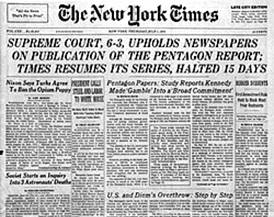Reading this account of discussions at the “U.S. Federal Trade Commission workshop on the future of journalism in the Internet age,” it appears “legacy media” might just slash and burn the First Amendment, shredding it to pieces on their journey to statist organ status.

In their desperation to stay alive, as newspapers and other legacy channels of distribution collapse, surviving publishers will maneuver themselves for prime suckling positions on the public teat. The keepers of the teat appear willing to enable the feast.
Federal and state officials this year have explored how the government might play a role in helping ease the financial travails of news organizations. Sen. Benjamin Cardin (D., Md.) this spring proposed a bill that would allow newspapers to operate as tax-exempt institutions. [MORE – WSJ]
“Public” money comes with a labyrinth of exponentially multiplying political strings attached. Just ask GM, AIG, and BofA.
If news organizations go 501(c)(3), will they be subject to the same restrictions on political activity as the churches?
No matter, the only way they will be allowed to stay anchored to the public teat is if they agree to have their testicles removed, and placed in a jar, on a stool, in the corner.
There will be a host of restrictions placed on these future state organs:
House Speaker Nancy Pelosi has asked the Department of Justice to consider a broad range of market factors in antitrust reviews, a step that could help clear a path for mergers of struggling papers. Congress has held several hearings about the financial challenges facing the industry. [MORE – WSJ]
Can you say Community Reinvestment Act (CRA) for news organizations? How much do you want to bet newspapers are going to have to meet specific hiring guidelines based strictly on race and gender quotas?
Who has time for trivialities like merit when there’s political correctness to be suffered?
The editorial and executive boards of publicly supported “news” outlets will be chosen by the public in the form of local ‘citizen news and information committees’.
Anyone want to guess who will control these local committees, and thus be empowered to grade the merger worthiness of news organizations? If you guess anything other than community organizations, you only get your news from the New York Times.
Under this scenario, the Federal government would necessarily lay down a smothering blanket of regulation on the world of publishing, defining and thus restricting the “how” and the “what” of news reporting, journalism, and editorial opinion making.
The government will have to do these things in order to define their new working relationship with the publicly controlled-supported entities. Or is the Federal government going to spend our tax dollars on failed businesses without a peep of legislation on the matter? That wouldn’t be very progressive.
Consider for a moment, the combination of whatever legislation they are brewing up in the meeting linked above, and McCain-Feingold campaign finance law. It doesn’t take much of an imagination to envision a future where the government holds tremendous sway over defining what is “political speech”, who may engage in political speech, how they may engage in it, and when.
Will you need a registered license to engage in “political speech” during election cycles? What is an election cycle when you are engaged in a “permanent campaign?”
The end result will be a vast new regime of communications regulations which will not serve the long term interests of the First Amendment. To the contrary, as with the McCain-Feingold “campaign reform” law, the First Amendment will be under direct assault.
COMMENTS
Please let us know if you're having issues with commenting.